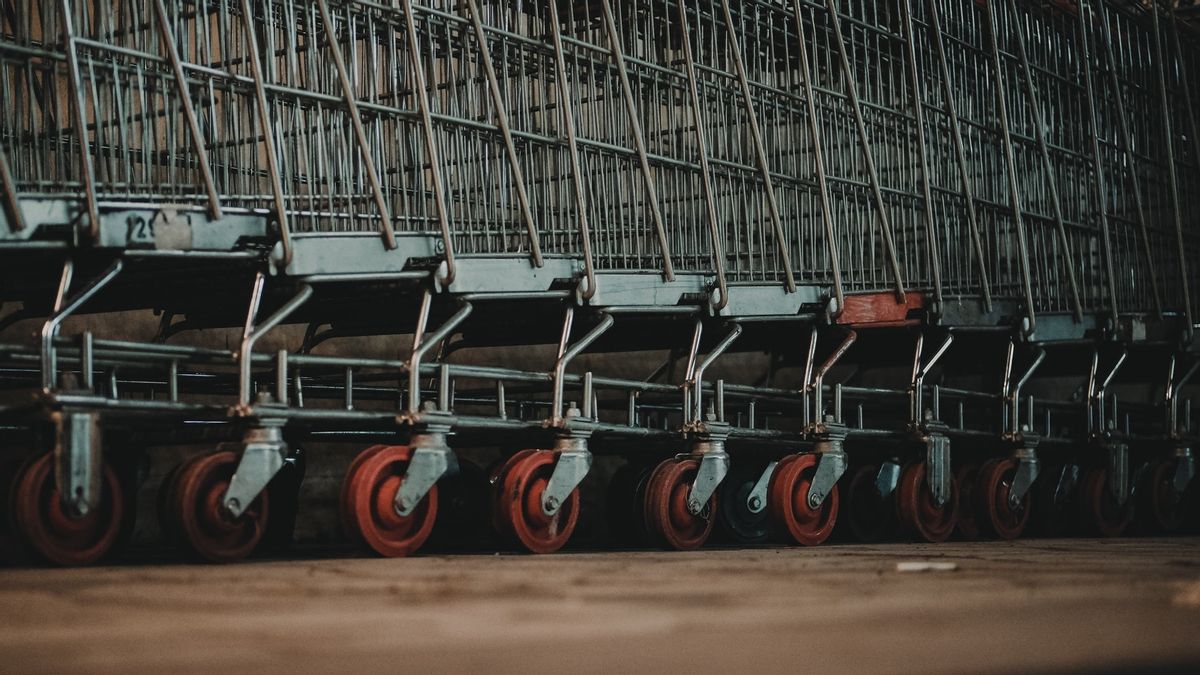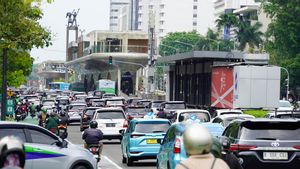JAKARTA - Retail stores and shopping centers or malls are starting to collapse one by one in the midst of the COVID-19 pandemic. Most recently, Golden Truly Mall officially closed its operations on December 1, 2020.
"To all our loyal customers, thank you for your trust and loyalty to Golden Truly Mall while being present at Jalan Gunung Sahari. Starting on December 1, 2020, the mall on Jalan Gunung Sahari No. 59 will be managed by a new building manager," Golden Truly wrote. His official Instagram, Wednesday, December 2.
The Association of Indonesian Shopping Centers (APPBI) said that the reason for shopping centers, or in this case the Golden Truly, was due to pressure from large-scale social restrictions (PSBB) policies.
As is known, during the transitional PSBB period in Jakarta, markets and malls were allowed to operate with a maximum of 50 percent of capacity. Market operating hours are regulated by the market manager. Shopping centers and malls operate from 09.00-21.00 WIB.
Deputy Chairman of the Indonesian Shopping Center Management Association (APPBI) Alphonzus Widjaja said that the condition of shopping centers is still in a bad condition. This is because the level of visits is still very low and people's purchasing power has not yet recovered.
"Many regions also limit visitors to shopping centers by 50 percent of capacity. Even if the maximum limit is reached, it will still not cover operational costs," he said, when contacted by VOI, Wednesday, December 2.
According to Alphonzus, after the transition to the PSBB in the Capital Region, the capacity of mall visitors has never reached the maximum limit, which is 50 percent.
Another factor that causes the collapse of shopping centers in the midst of the COVID-19 pandemic. The problem is that the ability of each shopping center to survive is different.
"The problem is that the ability of each shopping center is also different from one another. Each has different durability," he said.
Retailers that are Closed before the Golden TrulyThe closure of shopping centers is not the first time this has happened. Finally, PT Matahari Department Store Tbk (LPPF) also closed its outlets until the end of 2020. The total number of outlets that have been closed is 13.
In its report to the Indonesia Stock Exchange on Saturday, November 28, 2020, the company with the ticker ticker LPPF stated that 6 outlets were planned to be closed. The details are as many as 4 outlets in Java, 1 in Bali and 1 in Sulawesi.
"Thus, the number of our outlets that will operate at the end of 2020 will be 147 from the previous 153," said the management statement.

The company also ensures that it will not open new outlets in the fourth quarter of 2020 and the first quarter of 2021.
Previously, PT Ramayana Lestari Sentosa Tbk (RALS) was also forced to go out of business. Ramayana admits that the spread of the corona virus or COVID-19 has caused company sales to decline. This happened because the company closed some of its outlets.
Ramayana Lestari Sentosa's Finance Director, Suryanto, said that during the emergency response period for the spread of COVID-19, the company had temporarily closed some shops, until conditions allowed them to reopen.
Not only closing the operations of the Depok Ramayana outlet in connection with the spread of the COVID-19 outbreak that has hit Indonesia. The company also took termination steps (PHK) for the 84 employees who were at these outlets.
"The layoffs were carried out for 84 employees by giving severance pay in accordance with the applicable law in the joint agreement signed by the company and employees," he said, in an official statement, in Jakarta, Tuesday, April 14.
[/ read_more]
Then, Swedish fashion retailer H&M has also announced that it will close 170 stores worldwide this year, or about 40 percent of its stores. The exact affected locations have not been announced.
H&M reported a 50 percent drop in sales during the second quarter of 2020. As stores closed during a worldwide lockdown.
Not only h & m, Victoria Secret also plans to close 250 stores in the US and Canada permanently in the coming months. This will happen until at least 2022.
"There will be a lot more in 2021 and maybe a little bit more in 2022," said Victoria Secret Chief Financial Officer, Stuart Burgdorfer.
A fashion store under the Zara brand is also experienced, Inditex will close 1,200 stores worldwide by 2021. Instead, it will focus on expanding its larger stores.
The company also plans to encourage online business. The Spanish clothing retailer targets a quarter of its sales to come online by 2022.
Who Else Will Close After the Golden Truly?Executive Director of Retailer Services Nielsen Indonesia Yongky Susilo predicts that retailers that are victims of the pandemic are not over. It is estimated that there will be other retail companies following the Golden Truly decision.
Furthermore, Yongky said he felt that there would be more to close his shop. This is if the COVID-19 pandemic does not stop. Therefore, his party asked the public to be disciplined and affirmed. So that it doesn't fall apart, and the number of cases doesn't increase anymore.

Yongki explained that the retail industry has been in a state of pressure in recent years. The lowest period of performance in this industry was during the presidential election.
"The point is that our retail has been really slow for a long time. When the election fell, it is common for people to be afraid of shopping," he said.
Last year, said Yongki, the retail industry started to rise a little. Unfortunately, suddenly the COVID-19 pandemic emerged. The pandemic has limited the movement of people. In fact, the middle to upper class people today still tend to be afraid to shop and choose to pile up their money in the bank.
"And they also stopped trying. So there is no new job creation. Their money is piled up in the bank," he explained.
Furthermore, said Yongki, apart from the absence of spending intentions in the upper middle class society, people's purchasing power is also still falling. This was also reflected in the contraction of economic growth for two consecutive quarters in the second and third quarters.
This condition makes it difficult for retailers to get income. While they still have to pay expenses, ranging from employee salaries, rent, to taxes.
"Finally, the cash flow ran out, I couldn't stand it anymore," he said.
[/ read_more]
The English, Chinese, Japanese, Arabic, and French versions are automatically generated by the AI. So there may still be inaccuracies in translating, please always see Indonesian as our main language. (system supported by DigitalSiber.id)








